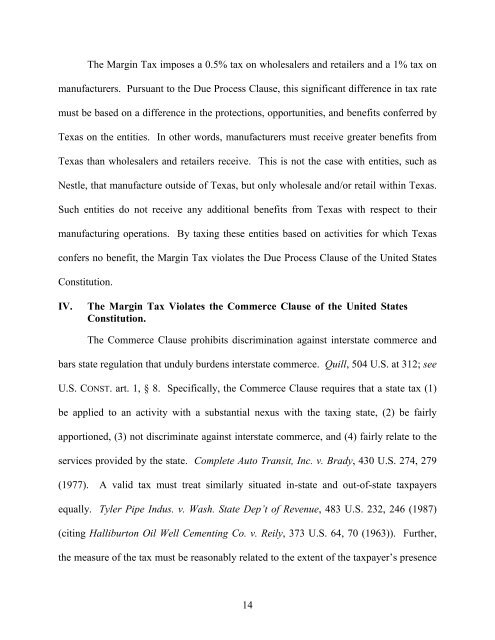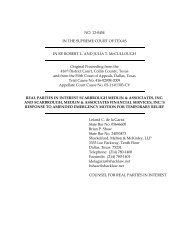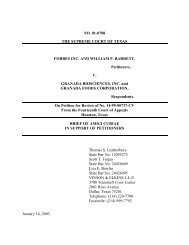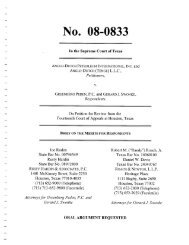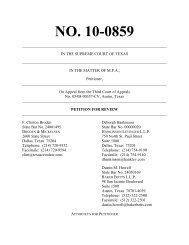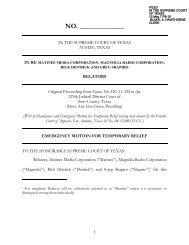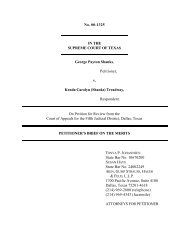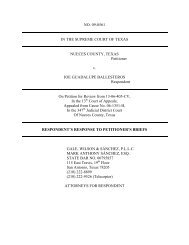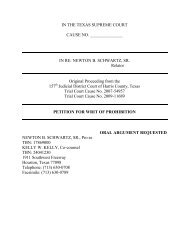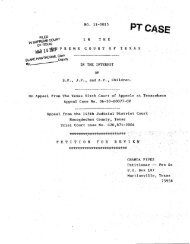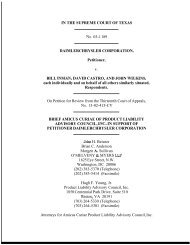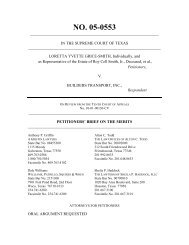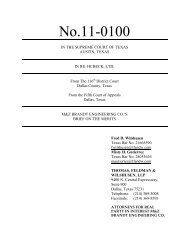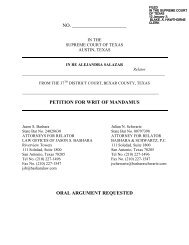- Page 1 and 2: No. __________ In The Supreme Court
- Page 3 and 4: TABLE OF CONTENTS IDENTITY OF PARTI
- Page 5 and 6: Rylander v. Fisher Controls Int’l
- Page 7 and 8: U.S. CONST. art. 1, § 8...........
- Page 9 and 10: STATEMENT OF JURISDICTION Section 1
- Page 11 and 12: STATEMENT OF FACTS I. The Margin Ta
- Page 13 and 14: taxable entity and to owners of cer
- Page 15 and 16: Texas. Id. Nestle conducts exclusiv
- Page 17 and 18: the same standard for all taxpayers
- Page 19 and 20: esults in an arbitrary amount of co
- Page 21 and 22: As detailed above, each step of the
- Page 23: twice the tax rate. There is no rat
- Page 27 and 28: CERTIFICATE OF SERVICE I certify th
- Page 29 and 30: Appendix 1 Texas Tax Code, Chapter
- Page 31 and 32: TAX CODE CHAPTER 171. FRANCHISE TAX
- Page 33 and 34: TAX CODE CHAPTER 171. FRANCHISE TAX
- Page 35 and 36: TAX CODE CHAPTER 171. FRANCHISE TAX
- Page 37 and 38: TAX CODE CHAPTER 171. FRANCHISE TAX
- Page 39 and 40: TAX CODE CHAPTER 171. FRANCHISE TAX
- Page 41 and 42: TAX CODE CHAPTER 171. FRANCHISE TAX
- Page 43 and 44: TAX CODE CHAPTER 171. FRANCHISE TAX
- Page 45 and 46: TAX CODE CHAPTER 171. FRANCHISE TAX
- Page 47 and 48: TAX CODE CHAPTER 171. FRANCHISE TAX
- Page 49 and 50: TAX CODE CHAPTER 171. FRANCHISE TAX
- Page 51 and 52: TAX CODE CHAPTER 171. FRANCHISE TAX
- Page 53 and 54: TAX CODE CHAPTER 171. FRANCHISE TAX
- Page 55 and 56: TAX CODE CHAPTER 171. FRANCHISE TAX
- Page 57 and 58: TAX CODE CHAPTER 171. FRANCHISE TAX
- Page 59 and 60: TAX CODE CHAPTER 171. FRANCHISE TAX
- Page 61 and 62: TAX CODE CHAPTER 171. FRANCHISE TAX
- Page 63 and 64: TAX CODE CHAPTER 171. FRANCHISE TAX
- Page 65 and 66: TAX CODE CHAPTER 171. FRANCHISE TAX
- Page 67 and 68: TAX CODE CHAPTER 171. FRANCHISE TAX
- Page 69 and 70: TAX CODE CHAPTER 171. FRANCHISE TAX
- Page 71 and 72: TAX CODE CHAPTER 171. FRANCHISE TAX
- Page 73 and 74: TAX CODE CHAPTER 171. FRANCHISE TAX
- Page 75 and 76:
TAX CODE CHAPTER 171. FRANCHISE TAX
- Page 77 and 78:
TAX CODE CHAPTER 171. FRANCHISE TAX
- Page 79 and 80:
TAX CODE CHAPTER 171. FRANCHISE TAX
- Page 81 and 82:
TAX CODE CHAPTER 171. FRANCHISE TAX
- Page 83 and 84:
TAX CODE CHAPTER 171. FRANCHISE TAX
- Page 85 and 86:
TAX CODE CHAPTER 171. FRANCHISE TAX
- Page 87 and 88:
TAX CODE CHAPTER 171. FRANCHISE TAX
- Page 89 and 90:
TAX CODE CHAPTER 171. FRANCHISE TAX
- Page 91 and 92:
TAX CODE CHAPTER 171. FRANCHISE TAX
- Page 93 and 94:
TAX CODE CHAPTER 171. FRANCHISE TAX
- Page 95 and 96:
TAX CODE CHAPTER 171. FRANCHISE TAX
- Page 97 and 98:
TAX CODE CHAPTER 171. FRANCHISE TAX
- Page 99 and 100:
TAX CODE CHAPTER 171. FRANCHISE TAX
- Page 101 and 102:
TAX CODE CHAPTER 171. FRANCHISE TAX
- Page 103 and 104:
TAX CODE CHAPTER 171. FRANCHISE TAX
- Page 105 and 106:
TAX CODE CHAPTER 171. FRANCHISE TAX
- Page 107 and 108:
TAX CODE CHAPTER 171. FRANCHISE TAX
- Page 109 and 110:
TAX CODE CHAPTER 171. FRANCHISE TAX
- Page 111 and 112:
TAX CODE CHAPTER 171. FRANCHISE TAX
- Page 113 and 114:
TAX CODE CHAPTER 171. FRANCHISE TAX
- Page 115 and 116:
TAX CODE CHAPTER 171. FRANCHISE TAX
- Page 117 and 118:
TAX CODE CHAPTER 171. FRANCHISE TAX
- Page 119 and 120:
UNITED STATES CONSTITUTION AMENDMEN
- Page 121 and 122:
UNITED STATES CONSTITUTION ARTICLE
- Page 123 and 124:
Appendix 4 Texas Constitution Artic
- Page 125 and 126:
(f) The occupation tax levied by an
- Page 127 and 128:
C -ki§, rod, AO ;i* 2012 Texas Fra
- Page 129 and 130:
Report (Form 05-163) annually to af
- Page 131 and 132:
Final Reports An entity that ceases
- Page 133 and 134:
An affiliated group can include:
- Page 135 and 136:
entity at the address listed on the
- Page 137 and 138:
Specific Line Instructions for Each
- Page 139 and 140:
• For a taxable entity filing as
- Page 141 and 142:
Item 11. Cost of goods sold (COGS)
- Page 143 and 144:
To compute Net Distributive Income
- Page 145 and 146:
Item 30, Tax due Item 28 multiplied
- Page 147 and 148:
e included in the combined group re
- Page 149 and 150:
Form 05-166 Texas Franchise Tax Aff
- Page 151 and 152:
Note: Do not enter any amount relat
- Page 153 and 154:
Appendix 6 Affidavit of Alan Pasets
- Page 155 and 156:
would have had a compensation deduc
- Page 157 and 158:
'32212 vet-. 35 ,3 :".f! A Texas Fr
- Page 159 and 160:
2.2 Val:, 3 liTexpavel rixliter 05
- Page 161 and 162:
7E2012 Vet- , 3.0 Texas Franchise T
- Page 163 and 164:
TE2C- 12 Vez' . 3. e. Texas Franchi
- Page 165 and 166:
TX2112 er, • ,q,p: Texas Franchis
- Page 167 and 168:
. 2 der, 3.4 Texas Franchise Tax Af
- Page 169 and 170:
TX2- 0 .4.2 Ver. 3. t+ ificode 1321
- Page 171 and 172:
TXS012 Ver. . 3,0 0,5-102 9-1 1 /30
- Page 173 and 174:
T2 12 05-102 ■.fRev 9-11/30# Tcot
- Page 175 and 176:
TX2012 Ver. 3.7 Ct 102 Rev 9- 1 1.'
- Page 177 and 178:
TX27.12. Var . Texas Franchise Tax
- Page 179 and 180:
TX201.2 ver. 05 102 (Rev 9-11/3c gi
- Page 181 and 182:
TXn12 'tee. Texas Franchise Tax Pub
- Page 183 and 184:
:x1:12 Texas Franchise Tax Public I
- Page 185 and 186:
PAYER'S name, street address, city,
- Page 187 and 188:
WINSTEAD Austin Dallas Fort Worth H
- Page 189 and 190:
Texas Comptroller of Public Account
- Page 191 and 192:
Texas Comptroller of Public Account
- Page 193 and 194:
Exhibit A Nestle USA, Inc. Nestle T
- Page 195 and 196:
11E Co May 15, 2012 COMPTROLLER OF
- Page 197 and 198:
AFFIDAVIT OF DONALD DEERE 1. My nam
- Page 199 and 200:
Revised Draft 10/19/2011 Economic A
- Page 201 and 202:
CAUSE NO. Filed 12 June 15 P3:17 Am
- Page 203 and 204:
activities in Texas, it is subject
- Page 205 and 206:
determination of the tax rate, cont
- Page 207 and 208:
elationship to the value of the Pri
- Page 209 and 210:
excess of $330,000. See id. §§ 17
- Page 211 and 212:
discriminate against interstate com
- Page 213 and 214:
Exhibit A Nestle USA, Inc. Nestle T
- Page 215 and 216:
Texas Comptroller of Public Account
- Page 217 and 218:
Texas Comptroller of Public Account
- Page 219 and 220:
Texas Comptroller of Public Account
- Page 221 and 222:
Exhibit A Nestle USA, Inc. Nestle T


